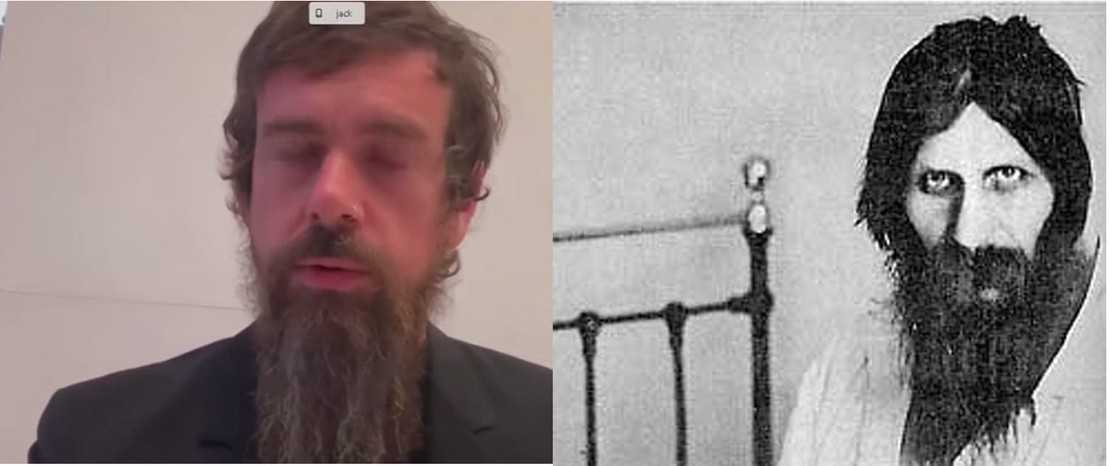Earlier Tuesday, Twitter tweeted this.
Earlier this week, in close coordination with our peers, we suspended a number of accounts targeting the election in Uganda.
If we can attribute any of this activity to state-backed actors, we will disclose to our archive of information operations:https://t.co/GB71n4avwm
— Twitter Public Policy (@Policy) January 12, 2021
The irony is beyond rich. It’s a vein of irony so massive that were it actual iron, it would cause the earth to wobble and fall off its axis.
What is “Twitter Public Policy”? Is Twitter a country now? It has 5,000 employees and it’s headed by a CEO who looks like Rasputin.

Twitter CEO Jack Dorsey, left, and Russian madman Rasputin, right.
Does Rastweetin have a foreign policy now, a secretary of state, a congress, or any of the systems of an actual country? Or is he just a childish demigod playing around with lightning and not noticing that he keeps setting things on fire?
Right now, the social media giants — and giants they are, more powerful than Standard Oil was when the government broke it up — rule the world. They’ve digitally deposed the sitting president of the United States. They’ve deplatformed potential competition in Parler and even suspended 85-year-old Ron Paul. They buried real information voters in the United States needed regarding one of the families that were then vying for power, and they got away with it.
The argument in support of their actions generally comes down to the fact that they’re privately owned companies and can do whatever they want without it becoming “censorship.” Is that the case, though? Not the privately owned part, we all get that. But what about the other part? Can they do whatever they want?
Some liberals clearly don’t believe that, hence, the ruinous lawsuits against the cake baker a few years ago. The cake baker was a tiny shop, singled out and targeted.
There’s case law saying that some companies that play certain roles can’t just do whatever they want. The larger they get, the more we Lilliputians might need to throw ropes across them.
I’m looking at a case from the 1940s during which time the United States was a very different place than it is now. Hardship had buffeted the country for more than a decade but we’d won the big war. There were such things as “company towns” in those days. A company could become large enough to not just make a product and provide jobs, or ships in the case of this company, but also provide housing, schools, streets, and whole towns for its workers. Like the old song says, once you started work at such a company you “sold your soul to the company store.”
That’s because, in many cases, you weren’t even paid in actual American dollars. You were paid in scrip that was only good in stores that the company you worked for, and which owned your house and your children’s school, owned. The company paid you. You paid the company right back to buy food, clothes, and other items you literally could not live without.
That’s how powerful some companies were. Could an average American ever challenge them? Or were they, like Twitter apparently thinks it is now, a jurisdiction unto itself?
Modern Americans cannot even imagine such a thing. The company town is alien to our entire existence now. But it wasn’t in the first half of the 20th century.
The company owned everything, even the public square. That’s important.
A Jehovah’s Witness tested this in a company town in Alabama in the 1940s. That town did not bar non-employees from entering or doing anything they could do outside the town. Grace Marsh, the Jehovah’s Witness, passed out religious literature on the sidewalk without first seeking permission from the company. The company didn’t like it and told her to stop. She didn’t stop. The company charged her with trespassing — she was on private property, and privately-owned companies can do whatever they want, right?
Marsh was convicted of trespassing in local court and her conviction was upheld in the Alabama Supreme Court. Her case went all the way up to the United States Supreme Court, which ruled that the First Amendment does not stop at the company’s property line. Grace Marsh, the court found, was exercising her constitutional rights in a public place even though it was privately owned. She won.
[t]he more an owner, for his advantage, opens up his property for use by the public in general, the more do his rights become circumscribed by the statutory and constitutional rights of those who use it.” The Court continued, “Whether a corporation or a municipality owns or possesses the town[,] the public in either case has an identical interest in the functioning of the community in such manner that the channels of communication remain free.”
Hm. The social media giants made their products “free,” turning all of us into the products. We are “the public in general.”
Might the Court’s logic in Marsh vs. Alabama apply to the digital channels and public sidewalks and virtual town squares of communication owned and operated and dominated by the tech giants? We may find out before long. Someone so banned should challenge the tech giants’ collective actions. Parler might be the David to grab a stone and take on the giants.
While we’re pondering that, we might ponder this. The federal government, soon to be totally controlled by the Democrats who undeniably benefit from the tech giants’ recent actions, will not take those giants on. That’s just a given. The loss of the two Senate seats in Georgia is devastating to the cause of accountability.
But might the states take up that cause? In December 2020, Poland began considering a bill that would levy huge fines on the tech giants every time they violate a Pole’s free speech rights.
Could any of the states do the same or something similar and have it withstand court challenges? I honestly do not know and would not predict what the courts here would make of such an attempt. They might see a relevant precedent in Marsh vs Alabama. They might not. John Roberts is a creative chief justice, to say the least.
But Texas, controlled by Republicans in all branches, is beginning its 87th Legislature this month. It or Florida would be logical states to consider a formal and effective legislative pushback. They’re large, they carry significant clout, and Republicans are in charge of them. The governors of both have an interest in championing some form of pushback, despite the fact that, at least in Texas, the tech giants are expanding their footprints.
Events continue to take an iron logic of their own which no one controls. Not even the tech giants, now. Mere anarchy has been loosed on our country for more than half a year now. The center cannot hold. Maybe the states and the courts can arrest the entropy and restore some sanity.









